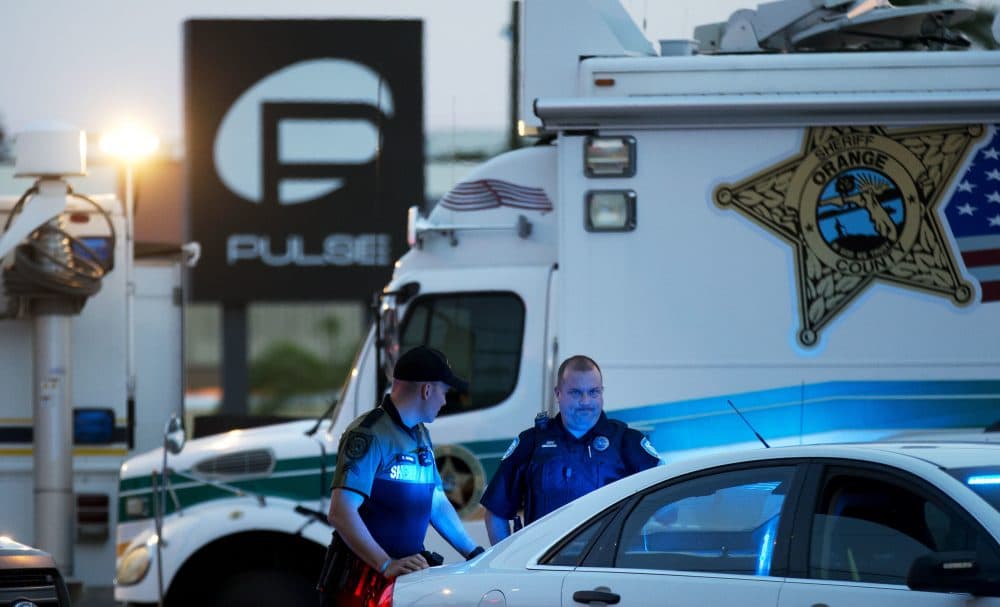Advertisement
ER Doctors Say It’s Time To Study Guns And Gun Violence
Resume
The Centers for Disease Control and Prevention have shied away from researching firearms and gun violence ever since 1996, when Congress passed an appropriations bill that forbade the CDC from using funds “to advocate or promote gun control.” Now a group of emergency room physicians is calling for an end to the CDC’s moratorium.
Dr. Jay Kaplan, President of the American College of Emergency Physicians joins Here & Now's Robin Young to talk about why.
Interview Highlights: Dr. Jay Kaplan
This new call began after the Orlando shootings. Tell us more:
I was at a meeting at the house of delegates of the American Medical Association in Chicago, and that Saturday night, early Sunday morning was when the Orlando event occurred. My colleagues at Orlando Regional Medical Center were responsible for responding to the multiple patients who came in with their severe injuries. When the fact of the mass casualties became known, there was an emergency resolution declaring that gun violence was a public health crisis in the United States and that we needed to do something about it. One of those things being to end the ban on firearm related research.
On his personal connection with shootings:
Yeah, my niece was shot at Thurston High School. She was in the cafeteria and heard some loud bangs and saw some blood on her clothes and thought she was having her period and realized all of a sudden she recognized had been shot. And she has found her way through after dealing with the post traumatic stress and still carries the scars.
On speaking to members of Congress on gun research:
Yeah, that was rather sad I have to say. I was saying what it would take to create some action would be if one of the congressman's own children or spouses were shot, and this young man spoke up and said, "Well, our own Gabby Gifford got shot and we couldn't do anything about it."
And then he challenged me, and he said, "What are you going to do about it?" And I said, "Give me any platform to speak in and I'm happy to talk about it." Because as emergency physicians we see this every day. We see the effects of gun violence every day, and we're the ones that have to deal with it, not only emergently in terms of the injuries that patients sustain, but the families that come in after and find out that their loved ones were either killed or severely injured.
On his thoughts about the intent of banning gun related research that would “promote gun control”:
Well, that's in fact what happened. it seems to me if there's a problem we want to face the problem head on and say this is an issue, what are we going to do about it? Let's study it. Let's propose some solutions and then let's try those solutions out, and let's see whether they worked or not. With regard to gun related violence, we haven't had that opportunity.
On what other results of research could be, and questions of bias:
Well, gun violence research might show that it makes sense for more people to carry guns. We don't know. And there is an assumption by those who oppose efforts to lift the ban, there's an assumption that if you do research that it's going to lead to gun control. We don't know that because we don't have the research.
A colleague of mine, who's an emergency physician, said to me, "You know gun violence is not a public health issue." And I said, "It kills over 32,000 people a year. That certainly is a public health issue." And I asked him about research and he said, "That research will be biased." And to me that's an excuse because I think that as scientists, the reason we do research is to define problems and to create solutions. Good, scientific research is research that's done without bias, and there's no reason to think that we couldn't do research on gun related violence and do it without bias.
On the potential for organizing independent research:
The answer is yes. And are we in the process of attempting to do so, and the answer is yes. Not in the organized fashion that the CDC could do or the National Institutes of Health could do. And that's what we're really looking for. We're looking for some kind of well-funded, organized effort at looking into solutions of looking into gun violence.
Guest
Jay Kaplan, M.D., president of the American College of Emergency Physicians. The organization tweets @EmergencyDocs.
This segment aired on July 11, 2016.